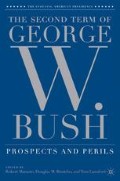Abstract
The 2004 presidential election represents President Bush’s third iteration of his controversial presidency. From the first, pre-9/11, he struggled for traction and seemed to loose ground. The second stage began on 9/11, as a result of which, he and his presidency were transformed and Bush went from having a vision to embracing a mission. The third act of his presidency began with his modest, but decisive reelection victory. The question is: What will he do with it? One purpose in this paper is to look both back and ahead to answer where this president is going, how he intends to get there, and what this means for American politics and policy.
Access this chapter
Tax calculation will be finalised at checkout
Purchases are for personal use only
Preview
Unable to display preview. Download preview PDF.
Notes
Stanley A. Renshon, In His Father’s Shadow: The Transformations of George W Bush (New York: Palgrave, 2004).
Thom Shanker, “As Criticism Grows, Bush Offers Support of Rumsfeld,” New York Times, December 21, 2004.
Jackie Calmes, John D. McKinnon and Brody Mullins, “Bush’s Embrace of New Initiatives Gains House Social Security Ally,” Wall Street Journal, May 4, 2005, p. A4.
Sheryl Gay Stolberg, “In Face of Opposition, Bush Renews Support for Bolton,” New York Times, May 14, 2005, p. A1.
David Ignatius, “Bush’s Next Test,” Washington Post, January 19, 2005, p. A19.
James David Barber, The Presidential Character: Predicting Performance in the White House ( New Jersey: Prentice-Hall, 1972 ).
Alexander George, “Assessing Presidential Character,” World Politics 26(2) (January, 1974), pp. 244–245.
Stanley A. Renshon, The Psychological Assessment of Presidential Candidates ( New York: Routledge, 1988 ).
Bob Woodward, Bush at War ( New York: Simon and Shuster, 2002 ), pp. 145–146. At one point Woodward asks Bush in an interview whether he let his National Security Advisor, Dr. Rice, know that he intended to press the members of his National Security Council on several matters to which Bush replied, “Of course, not. I’m the Commander-in-Chief, see I don’t need to explain-I do not need to explain why I say things.” This does not sound like a president willing to give up his authority and decision role to others.
E.J. Dione, “What Bush Could Say,” Washington Post, January 18, 2005, p. A17.
George W. Bush, “Transcript- President Bush’s Second Inaugural Address,” Washington Post, January 20, 2005;
see also Elisabeth Bumiller and Richard W. Stevenson, “Bush, at 2nd Inaugural, Says Spread of Liberty Is the Calling of Our Time,” New York Times, January 21, 2005.
George W. Bush, “Text-President Bush’s State of the Union Address,” New York Times, February 2, 2005;
see also Todd S. Purdum, “Yet Another Bold Stroke,” New York Times, February 3, 2005.
Elizabeth Cliff, “Seeking Putin’s Soul,” Newsweek Online, December 17, 2004.
Peter Baker, “Dealings With Putin Discussed,” Washington Post, December 12, 2004, p. A24.
Elisabeth Bumiller, “Russia Objects to Bush Visit to Neighbors; Rice Replies,” New York Times, May 6, 2005, p. A8.
Elisabeth Bumiller, “Bush Encourages Georgia With a Warning to Russia,” New York Times, May 11, 2005, p. A3.
Editorial, “Mr. Fox Comes to Washington,” New York Times, September 6, 2001.
Mike Allen and Peter Baker, “On Kerik Nomination, White House Missed Red Flags,” Washington Post, December 15, 2004, p. A04.
George W. Bush, “Remarks In a Telephone Conversation With New York City Mayor Rudolph Giuliani and New York Governor George Pataki and an Exchange with Reporters,” (September 11, 2001) Weekly Compilation of Presidential Documents, (September 17, 2001 ), 37 (37) p. 1308.
Terry M. Neal, “Bush Energized by S.C. Victory,” Washington Post, February 20, 2000, p. A11.
Will Lester, “Americans Hopeful on Second Bush Term,” Associated Press, January 16, 2005.
Richard E. Neustadt, Presidential Power ( New York: John Wiley, 1960 ).
Walter Dean Burnham, Critical Elections and the Mainsprings of American Politics ( New York: Norton, 1970 ).
David Mayhew, Electoral Realignments: A Critique of an American Genre ( New Haven, CT: Yale University Press, 2002 ).
Andrew E. Busch, “Rolling Realignment,” Claremont Review of Books, (Winter, 2004 ).
Patrick D. Healy, “Clinton Seeks Common Ground on Abortion,” New York Times, January 25, 2005.
Peter Bernard, “Fighting Faith: An Argument for a New Liberalism,” The New Republic, December 13, 2004.
Brett Hume, “Raw Data: Text of Bush Interview,” Fox News, September 22, 2003.
Dick Morris, “How Second Terms Fail,” New York Post, January 19, 2005.
Yochi J. Dreazen and David Rogers, “Senate Democrats Engineer a Delay of Vote on Bolton,” Wall Street Journal, May 27, 2005, p. A3.
Howard Fineman, “Food Fight in the Big Tent,” Newsweek, May 24, 2005.
Harold Meyerson “Arnold Meets His Match,” Washington Post, May 25, 2007, p. A27.
Warren Hodge, “U.N. Votes to Send Any Sudan War Crimes Suspects to the World Court,” New York Times, April 1, 2005, p. A6.
Editor information
Editors and Affiliations
Copyright information
© 2006 Robert Maranto, Douglas M. Brattebo, Tom Lansford
About this chapter
Cite this chapter
Renshon, S.A. (2006). George W. Bush: A Transformational Leader at Midterm. In: Maranto, R., Brattebo, D.M., Lansford, T. (eds) The Second Term of George W. Bush: Prospects and Perils. The Evolving American Presidency Series. Palgrave Macmillan, New York. https://doi.org/10.1057/9781403984418_13
Download citation
DOI: https://doi.org/10.1057/9781403984418_13
Publisher Name: Palgrave Macmillan, New York
Print ISBN: 978-1-349-53412-8
Online ISBN: 978-1-4039-8441-8
eBook Packages: Palgrave Political & Intern. Studies CollectionPolitical Science and International Studies (R0)

